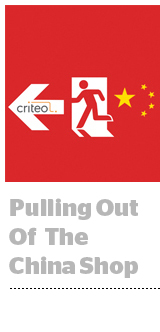
You’ve got to be a tough cookie and have good fortune to crack the China market. And success in other regions is not a guarantee of success in the People’s Republic.
Such was the case with Criteo, which, after investing heavily in the domestic China market, discreetly pulled out in late May, nearly three years to the day after first launching local operations.
The decision was primarily driven by “challenges associated with the complexity of China’s market, coupled with a high client sensitivity around providing access to the data that is vital for Criteo’s technology to perform at optimum levels,” a Criteo spokesperson told AdExchanger.
There is, however, still a ripe opportunity to work with Chinese advertisers that need help growing outside of China, and Criteo will shift its focus to concentrate on supporting that sector.
Although Criteo’s China withdrawal wasn’t inevitable, it also wasn’t all that unexpected, said Sara Ye, president of international markets at iPinYou, one of the largest demand-side platforms (DSPs) in China.
The Beijing-based programmatic buying platform, which describes itself as a mix between The Trade Desk and DoubleClick Bid Manager, has soaked up a lot of Criteo’s business in China since its exit, Ye said.
“We’ve seen many examples of international players failing here even though they’ve been very aggressive in what they were trying to achieve,” Ye said. “China is a complicated market, and it’s often difficult for international companies to understand how to provide value.”
Criteo made the right moves on paper – putting feet on the ground with offices in Shanghai and Beijing and opening a data center on the mainland – but establishing local relationships proved tough.
As Criteo CEO Eric Eichmann noted during an earnings call less than a month before the pullout, making inroads with the buy side, especially ecommerce sites, was no easy task.
“We are having a hard time integrating our solution fully with advertisers, in that advertisers are most skeptical about having us see the sales that are generated from our campaigns,” Eichmann explained to investors. “That, for us, is difficult in the sense that if we don’t know whether we are driving our sale or not, it makes it hard for our technology to perform.”
Criteo also had to do a lot of legwork to connect to supply in China, which Eichmann called an “in-app-centric market.”
The publisher dynamic is a different – and very mobile – beast in China, said Grace Huang, iPinYou’s CEO and co-founder.
“Mobile is growing extremely fast – between 60% and 70% of our business comes from mobile,” Huang said. “The speed of development in mobile advertising in China makes it difficult for many foreign players to catch up.”
The BAT companies – Baidu, Alibaba and Tencent – also jealously guard their inventory.
“They want to do everything themselves,” Huang said. “A lot of major publishers have developed their own SSP technology, including BAT, and they have their own exchanges as well. We’re connected to individual apps or video sites directly, but foreign companies find it very hard to access this Chinese inventory.”
The result is a market that is competitive, complex and often closed off, at least to outsiders.
“It’s harder in China,” Eichmann said on stage at AdExchanger’s Industry Preview conference in January. “There is more resistance to letting third parties come in and see the information on your site.”
But doing business with China can be about more than just doing business in China.
Criteo is still invested in what the company’s spokesperson called its “export business” by helping advertisers in China run campaigns and reach shoppers beyond their own borders.
Chinese advertisers looking for international exposure comprise a budding business for iPinYou as well, which opened its first US office in Seattle last September.
But the DSP is also providing support for US and European advertisers that need a little handholding in order to try their hand in China, iPinYou’s home base.
“The China market is very dynamic, so there are new ad formats and new inventory sources coming out all the time, every week, every month,” Ye said. “Given that we’re local, our teams can react to the market more rapidly. For international companies, this can be much harder.”
This post was syndicated from Ad Exchanger.

More Stories
Creativity shines
Hilton Uses Social Listening to Showcase ‘Superior’ Stays
Spring surge of members for World Out of Home